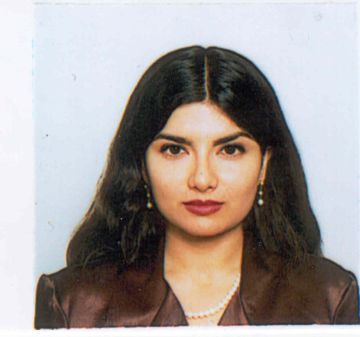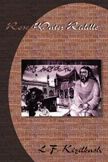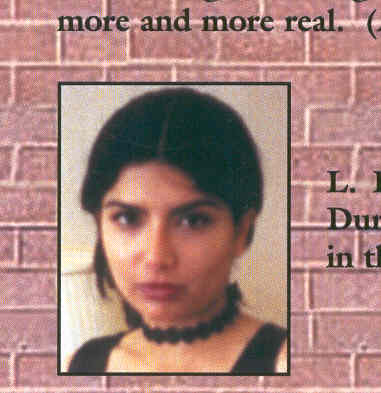Contribute
| Lokvani Talks To Leena.F. Kizilbash |
Chitra Parayath
06/02/2004
The intriguing bio that Leena sent me before I talk to her attests that:
“I was born in Karachi, Pakistan. Since the age of two I have been a nomad. Rootless in address yet weighted in heritage and language. My home is filled with Urdu speakers.
The weight of tradition has at time felt like fetters, but has also allowed me to dive deeper into states of thoughtfulness.
Thoughtfulness has led me to psychiatry, one of the few fields in medicine that is not strictly protocol driven. For the future I hope to continue treating madness and capturing meter.”
“That is me in a nutshell, ” she laughs over the telephone in her charmingly breathy voice. A young South Asian woman who has found her voice in the poems and prose she pens, Leena is working on a novel, which she tells me is near completion.
Lokvani: There is no questioning poetry's relevance to contemporary culture but it has also been called a ‘specialized occupation of a relatively small and isolated group’. What do you think?
LFK: The traditional sense of Poet, as isolated phenomena is American culture. In music it is more general but part of a greater piece. Good poetry often provokes contemplation.
Lokvani: Were you reading poetry at a young age? Who did you read what type of lasting influence did the poets and poems have on you? Which contemporary poets do you most admire?
LFK: As a child I loved Dr.Seuss. "A Wrinkle in Time," was adventurous reading. In adult life, I have enjoyed "Human Wishes" and "Praise" by Robert Hass. "Suttree" by Cormac McCarthy is a lyrical novel I’ve enjoyed.
Lokvani: When did you start writing poetry? Poetry and Psychiatry, is there a connection?
LFK: Started writing at 12 ... wrote prolifically for a year. Stopped. Resumed writing creatively in college ... and have been writing poetry and short stories on and off ever since. I also found that I was writing poems , some of which are in the medical section of Rose Water Riddle during long hours spent as a medical resident! In January I started a novel that has a second-generation Indian-American psychiatry resident as the protagonist. I hope to finish the book by November of this year.
Lokvani: How important or pertinent is the conflict whether or not you’re being Asian enough in your writing? Do you feel like you should be regarded as a desi poet/writer because you write about ‘traditional’ things?
LFK: Identity issues and cross-cultural issues do play their part in my life.
Lokvani: What about venues for publication of poetry? Are there enough?
LFK: Poetry is difficult to get published. I used a subsidy publisher, Dorrance Publishing.
Lokvani: How do you define a poet? Do you think there are an increasing number of readers of poetry, as well? Has poetry flourished?
LFK: I don't think I am qualified to define a poet.
Lokvani: You write all kinds of poems, many of which could be called narrative. Yet some poems seem more like a series of fragments than it does a story.
LFK: I do like to alter the voice of a poem. Sometimes the shape is meaningful, sometimes playful, or both.
Lokvani: How did the different landscapes and cultures of your childhood influence you as a writer and as a human being?
LFK: My sense of family is very sub-continent ... sense of sound is mixed... intellectually more western. I grew up, practically around the globe, but I do retain a mixed sound as far as my writings are concerned.
Lokvani: How would you describe your poems? Are they formal? Free verse? Both? Do you start with ideas when you write, or do you start with words and sounds?
LFK: Most of my poems are free form. I usually begin with an inspired sentence or words and ideas unravel in the making of the poem.
Lokvani: Are there particular subjects, themes, and obsessions that come up in your poems again and again?
LFK: You can judge that by reading my work.
Lokvani: What qualities, characteristics, and skills does a person have to have in order to be a poet?
LFK: Being well read helps.
Lokvani: Your poems show a remarkable narrative power and a tense poetic language. What's the impact of the storyteller upon the poet?
LFK: People interpret the same poem quite differently. Two Pakistani men I know … one took "slice the sun" as a very humorous piece, and the other one took it as "isolation."
Lokvani: How do you know when a poem is finished? Or, when it's dead?
LFK: I can revise a poem two to ten times. if a poem does not work, I may keep a few words or lines for another poem and discard the rest of the poem.
Lokvani: How does commerce enter the life of a poet? Are you above the fray when it comes to how many books you hope to sell?
LFK: I would like to have a greater audience for my work.
Lokvani: Which younger poets do you believe are doing the most promising work? Are there any with whom you feel a strong literary kinship?
LFK: Unfortunately i have not read many of the younger poets...however on Wednesday evening at the Cantab lounge in Cambridge and Sunday evening at the Lizard Lounge in Cambridge there are some great performance poets.
A sample of Leena’s work is reproduced here with her permission.
Night Swim
Thirst of an ocean
Seabed of salt
Anchorless desire
Mapping her horizons
With his hand creases
Measurements of dark
Coal feeds the fire
Water burn
Part of her hip
Night swim.
Going to the Corner Shop
Chill, chill. Coals by my belly. Jam on toast. Toast flame touched and warm. Ghee in tea like breakfast in Kashmir. Bread ripped, then dipped. Moist soak in mouth. Store bought bread pre-sliced. Evenly tender so I burn it part by part. Gas flame match lit. Cockroaches crawl on the walls of this kitchen. Hand hammered aluminum sink. I wash dishes. Smoke in the aa’inah. Small piece of glass in the windowsill reflects my eye, eye smoked to red web healing. The purr of water and spray keeps me cool.
Skip to the store. The chiti in hand is square like bread. Says cereal, Nido, Ovaltine. Muktar in hand and burkha on head. Securely I seek passage through streets rife with men. My heart a murmur but I look down.
Supple wrists glue crushed glass to kite string, to cut down the opponent's kite. His eyes are dusty Afghan green. I looked with impunity when girlhood was a hood and now desire is a downpour and I'm downcast.
Thirteen toffees. Two for each and three for me. Carry the cream sodas home. Muktar, stop drinking and walking. You've bent the straw and spend your breath at a loss. Tear the tip just a bit. Don't blow bubbles. Green boil building. Give it. Snatch. Spill. In an hour the spill will be a sidewalk glow and ants not crushed underfoot will leave it dizzy and full.
Stop drinking. Some slip of your spit slips down the glass bottles. It's rude to run and chew and walk and swallow. Rude to pull at my burkha.
The sidewalk border is rubble. Red rivulets of blood by the butcher shop. Should we take the side road to avoid the paan shop.
The boy lighting a cigarette with rope dangling from the paan shop got an electric shock from decorating the wall of Mecca with lights. He fell. Look at him shake like a leaf and wiggle like a woman.
\"Wooo…Wooo\" Don't mimic him, Muk. Everyone calls his fits 'Electric Shock.' Look quickly. In a moment he'll be calm and pick up his cigarettes and laugh with the others.
I have a certain longing for all of them. Even Mr. Electric Shock. Isn't it democratic. To prefer him. And to bind him. My mouth full of rope.
Paan: Edible betel leaf treat
Chitti: Chit
Rose Water Riddle can be purchased by visiting to the website
http://www.dorrancebookstore.com/roswatrid.html
This book is also available for download as an E-Book in Adobe Acrobat (pdf) format.
NOTE: In order to view this e-book, you're going to need the Adobe Acrobat Reader.
You may also access this article through our web-site http://www.lokvani.com/


